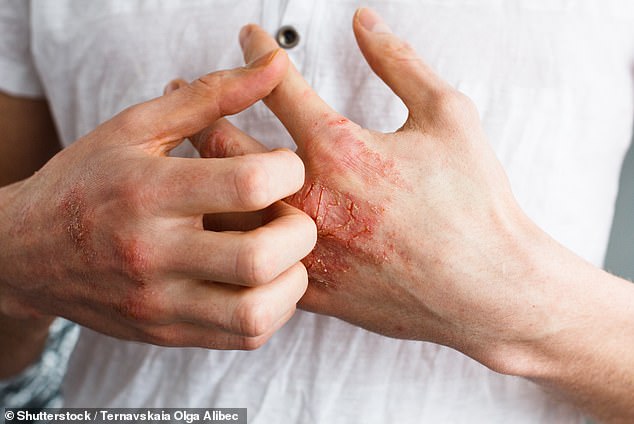If you are prone to eczema, you may want to stop using Lays.
A new study has found that salty foods increase the likelihood of itching attacks.
Each additional gram of sodium consumed per day (the amount in a McDonald’s Big Mac) was linked to a 22 percent increase in the risk of eczema.
Experts believe that salt can trigger the growth of Staphylococcus aureus, a common type of bacteria that lives on our skin, which scientists believe is responsible for the need to scratch, which causes skin damage.
Eating just one extra gram of salt a day (the amount in a Big Mac) increases the likelihood of having itching attacks by 22 percent, scientists at the University of California, San Francisco, found.
The skin condition, also known as atopic dermatitis, causes dry, itchy skin and will affect one in 10 Americans at some point in their lives.
Eczema has become more common in recent years, which has pointed to lifestyle factors such as diet.
About 90 percent of Americans consume too much salt, according to the FDA, which recommends that adults limit their daily intake to less than 2.3 grams a day.
Researchers at the University of California, San Francisco analyzed data from more than 215,000 people aged 30 to 70 from the UK Biobank, which includes urine samples and online medical records.
They could tell how much sodium each person consumed from urine samples; and they could see whether people had a diagnosis of atopic dermatitis, as well as how severe the condition was, from prescription codes.
Every gram of sodium excreted in the urine over 24 hours was associated with an 11 percent higher chance of an eczema diagnosis; 16 percent more likely to have an active case and 11 percent more likely to have a severe case of eczema.
Researchers also looked at 13,000 American adults who participated in the National Health and Nutrition Examination Survey and found that eating just one extra gram of salt a day – equivalent to half a teaspoon – was linked to a 22 percent greater chance of someone suffered from eczema.
Limiting the amount of salt in the diet of eczema patients could help them control the disease, researchers said.
“Most Americans eat too much salt and can safely reduce their intake to recommended levels,” said Dr. Katrina Abuabara, associate professor of dermatology at UCSF and senior author of the study.
“For patients, eczema flare-ups can be difficult to cope with,” he added, “especially when they can’t anticipate them and have no recommendations for what they can do to avoid them.”
The study was published in the journal JAMA Dermatology.
Eczema is a group of inflammatory skin conditions that cause itchy, dry skin, rashes, scaly patches, and infections.
Dermatologists often first prescribe creams and washes to treat dry skin and steroid creams to reduce swelling and redness.
If these are not effective, immunosuppressive drugs, such as cyclosporine or methotrexate, are administered.
These work by inhibiting certain parts of the immune system that cause inflammation, but can negatively affect immunity and the liver.
The condition can intensify to such a point that it becomes debilitating, with inflamed skin all over the body.
Sufferers may have to endure burning sensations or have to wrap affected areas with bandages. It can also cause stress and depression.
It is thought to occur in people with a common genetic mutation that causes very dry skin.
Symptom flares can also be related to allergies or triggered by certain soaps or foods.

